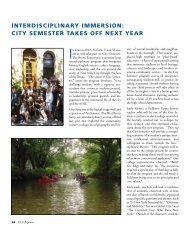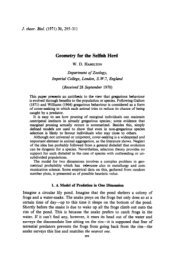Chapter 6 - Ethical Culture Fieldston School
Chapter 6 - Ethical Culture Fieldston School
Chapter 6 - Ethical Culture Fieldston School
Create successful ePaper yourself
Turn your PDF publications into a flip-book with our unique Google optimized e-Paper software.
“Mr. Sinatra Gets Rejected”<br />
show, and was invited to tour with a series of other acts in Bowes’s national<br />
company. Sinatra stayed on until the bullying of other group members led him to<br />
quit at the end of the year.<br />
Marty Sinatra was disappointed in his nineteen year‐old son. Here was<br />
one more failed attempt to make something of himself. But for Frank the<br />
Hoboken Four had never been much more than a necessary detour on the road to<br />
becoming a solo act. As usual, Dolly supported him. “The two of you are driving<br />
me nuts,” she said of the fighting between father and son. “Frankie wants to sing,<br />
Marty. Jesus Christ, let him sing, will ya?” Once more, it appears, Mother Knew<br />
Best. 18<br />
The next stage in Sinatra’s career began in 1937 when a song promoter<br />
named Hank Sanicola became his unofficial manager and got him a job waiting<br />
tables and singing with the house band at the Rustic Cabin, a club in Englewood,<br />
New Jersey, right on the shore of the Hudson. But even Dolly was dubious about<br />
this idea. “His salary was only fifteen dollars a week, and I used to give him<br />
practically twice that so he could pick up the tabs of his friends when they<br />
dropped in,” she said. “When he got a five dollar raise, I told him ‘This isn’t<br />
getting me anywhere. It would be cheaper to keep you at home.’ ‘Mama,’ he said,<br />
it’s going to roll in someday. I’m going to be big time.’ He always believed<br />
that.” 19<br />
While the Rustic Cabin was hardly a major musical showcase, it offered a<br />
number of crucial advantages to Sinatra. One was its strategic location near the<br />
George Washington Bridge, which provided him easy access to the most<br />
important New York City venues, where he could see and learn what was going<br />
on. The other was that the Rustic Cabin had a direct radio wire to radio station<br />
18 Dolly Sinatra quoted in Taraborelli, p. 23.<br />
American History for Cynical Beginners<br />
17
















